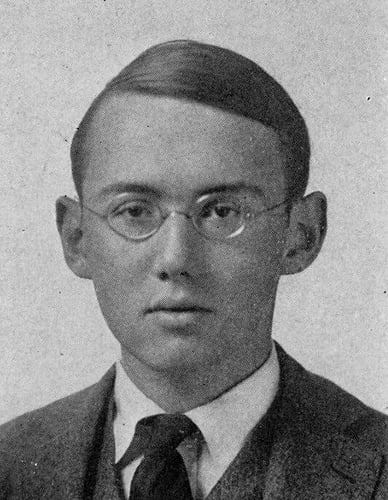It rained a lot that spring. You woke in the morning
And saw the sky still clouded, the streets still wet,
But nobody noticed so much, except the taxis
And the people who parade. You don't, in a city.
The parks got very green. All the trees were green
Far into July and August, heavy with leaf,
Heavy with leaf and the long roots boring and spreading,
But nobody noticed that but the city gardeners
And they don't talk.
Oh, on Sundays, perhaps you'd notice:
Walking through certain blocks, by the shut, proud houses
With the windows boarded, the people gone away,
You'd suddenly see the queerest small shoots of green
Poking through cracks and crevices in the stone
And a bird-sown flower, red on a balcony,
But then you made jokes about grass growing in the streets
And gags and a musical show called "Hot and Wet."
It made a good box for the papers. When the flamingo
Flew into a meeting of the Board of Estimate,
The new mayor acted at once and called the photographers.
When the first green creeper crawled upon Brooklyn Bridge,
They thought it was ornamental. They let it stay.
That was the year the termites came to New York
And they don't do well in cold climates—but listen, Joe,
They're only ants, and ants are nothing but insects.
It was funny and yet rather wistful, in a way
(As Heywood Broun pointed out in the World-Telegram)
To think of them looking for wood in a steel city.
It made you feel about life. It was too divine.
There were funny pictures by all the smart, funny artists
And Macy's ran a terribly clever ad:
"The Widow's Termite" or something.
There was no
Disturbance. Even the Communists didn't protest
And say they were Morgan hirelings. It was too hot,
Too hot to protest, too hot to get excited,
An even African heat, lush, fertile and steamy,
That soaked into bone and mind and never once broke.
The warm rain fell in fierce showers and ceased and fell.
Pretty soon you got used to its always being that way.
You got used to the changed rhythm, the altered beat,
To people walking slower, to the whole bright
Fierce pulse of the city slowing, to men in shorts,
To the new sun-helmets from Best's and the cop's white uniforms,
And the long noon-rest in the offices, everywhere.
It wasn't a plan or anything. It just happened.
The fingers tapped slower, the office-boys
Dozed on their benches, the bookkeeper yawned at his desk.
The A. T. & T. was the first to change the shifts
And establish an official siesta-room;
But they were always efficient. Mostly it just
Happened like sleep itself, like a tropic sleep,
Till even the Thirties were deserted at noon
Except for a few tourists and one damp cop.
They ran boats to see the big lilies on the North River
But it was only the tourists who really noticed
The flocks of rose-and-green parrots and parakeets
Nesting in the stone crannies of the Cathedral.
The rest of us had forgotten when they first came.
There wasn't any real change, it was just a heat spell,
A rain spell, a funny summer, a weather-man's joke,
In spite of the geraniums three feet high
In the tin-can gardens of Hester and Desbrosses.
New York was New York. It couldn't turn inside out.
When they got the news from Woods Hole about the Gulf Stream,
The Times ran a adequate story.
But nobody reads those stories but science-cranks.
Until, one day, a somnolent city-editor
Gave a new cub the termite yarn to break his teeth on.
The cub was just down from Vermont, so he took his time.
He was serious about it. He went around.
He read all about termites in the Public Library
And it made him sore when they fired him.
So, one evening,
Talking with an old watchman, beside the first
Raw girders of the new Planetopolis Building
(Ten thousand brine-cooled offices, each with shower)
He saw a dark line creeping across the rubble
And turned a flashlight on it.
"Say, buddy," he said,
"You'd better look out for those ants. They eat wood, you know,
They'll have your shack down in no time."
The watchman spat.
"Oh, they've quit eating wood," he said, in a casual voice,
"I thought everybody knew that."
—and, reaching down,
He pried from the insect jaws the bright crumb of steel.
Credit
Copyright © 1933 by Stephen Vincent Benét, renewed © 1961 by Rosemary Carr Benét. Used with permission of Brandt & Hochman Literary Agents, Inc. All rights reserved. No part of this poem may be reproduced in any form without the written consent of the publisher.
Date Published
01/01/1933

